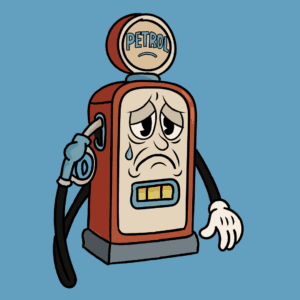TLDR: Plenty of endurance athletes aren’t experiencing low energy availability because they don’t know better, leaving them asking how to I actually stop underfuelling? You’re underfuelling because something deeper is getting in the way. Old beliefs, identity, and the illusion of control all play a role. It takes trust, autonomy, lived experience, and coaching that speaks to who you are, not just what you eat. You need to focus on unlearning the belief that less is better. Start by fuelling your long sessions, noticing how much stronger you feel, and working with someone you trust to rebuild confidence in eating more.

That one sentence haunted her for years.
Every plateau, every bad session, her coach said the same thing: lose weight. And she listened. Like so many athletes, she trusted the advice because it came wrapped in authority and trust that her best interest were at heart. He was her coach. And wasn’t that just part of sport?
So she cut back. Ate less. Trained more. Praised often.
And for a while, it worked.
Until it didn’t.
The fatigue crept in first, a dull background hum that never quite lifted. Then came the cold hands, the niggles, the slower splits. By the time her periods stopped, she’d convinced herself it was just stress. Or bad luck.
But deep down? She suspected something was off.
Eventually, she switched coaches. Her new one was kind. Informed. Supportive. They talked about energy availability, relative energy deficiency in sport, fuelling to train, not just to look lean or meet some arbitrary “race weight”. She nodded. Took notes. Downloaded the articles. Even started adding in more food.
But the old rules whispered in the background.
“You don’t need that gel.”
“You’re not training hard enough for a full portion.”
“Careful. You’re getting too comfortable.”
The issue wasn’t knowledge. It was about identity leading to the question “how do I stop underfuelling?”
Most endurance athletes have heard the basics:
Eat carbs before, during, and after training.
Fuel long sessions, don’t fast through them.
Low energy availability increases injury risk.
But here’s the thing: knowing isn’t the same as doing.
Not when you’ve spent years tying your worth to how lean you look in race photos.
Not when discipline has always meant less; less food, less rest, less softness.
Not when eating more feels like “giving in.”
The problem isn’t a lack of knowledge.
It’s fear.
Fear of weight gain.
Fear of slowing down.
Fear of being seen as lazy, greedy, or undisciplined.
That’s why another workshop or seminar won’t change anything.
Because what people need isn’t more information. It’s permission.
What helps athletes let go of restriction?
Permission from someone they trust.
Someone who says: “You’re allowed to fuel. You’re supposed to.”
Proof that it works.
Not just from studies and stats, but lived experience. A strong long run. A ride that felt good. Real evidence, felt in the legs, not read in a journal.
A mirror
Not a mirror to show how their body looks but a metaphorical mirror held up with compassionate to show them them their thoughts, feelings and behaviours. To show them what they can’t always see on their own: that their “discipline” is draining them. That they’re performing at half-mast. That there’s another way.
Coaching that goes deeper than macros.
Because changing food habits fundamentally means changing behaviour and sometimes beliefs. Values, identity, and autonomy need to be considered not just calorie targets.
These aren’t excuses. They’re real issues. And they need gentle unpacking, not tough love.
“I’m scared eating more will add weight.”
Totally understandable. But fuelling often improves body composition. Not always by weight loss, but by preserving or gaining muscle. We also know that athletes can sometimes perform better when they gain weight. For many who are underfuelling weight gain and some increase in body fat should be the primary aim.
“I don’t want to lose my discipline.”
Restriction can feel like control. But real discipline? That’s fuelling with intention. Making the hard choice to nourish, even when it feels uncomfortable is true bravery.
“I already know about carbs.”
Of course you do. But knowledge isn’t always action. That’s doesn’t mean the education was wrong or that there is something wrong with you, it’s a sign that something deeper needs support.
“I feel fine most of the time.”
Fine isn’t the goal. You deserve to feel strong, powerful, clear-headed. If you’ve been running at 70% for years, 100% will feel like a revelation.
“I’m not sure I trust my hunger.”
That’s OK. After years of suppressing it, hunger can feel noisy or wrong. But tuning into hunger is a skill, and like any skill, it can be practiced and improved.
Back to our athlete.
She didn’t have an epiphany on the turbo. There was no dramatic meal plan overhaul. Just one quiet Tuesday, she rode long and actually fuelled.
Not with guilt.
Not with rules.
Just… with carbs.
She ate before. Took gels during. And noticed something:
She felt strong.
And then she kept feeling strong.
And then she finished flying.
That ride? It started to rewrite something.
Not overnight. But it planted a seed. That maybe eating more doesn’t mean losing control. Maybe fuelling is discipline. Maybe “peaking” isn’t how lean you look, but how good you feel doing the sport you love.
That night, she pulled out an old photo of her leanest self, the one she used to idolise.
And for the first time, she didn’t long to go back.
She felt sorry for that version of herself.
Because now, she finally understood:
The win wasn’t being light.
It’s being and feeling strong, fuelled and happy.
And damn, that feels fast.

Paul is a sports nutrition consultant and educator with a PhD in Nutrition and Exercise Science. With over a decade of experience, Paul specialises in optimising performance and recovery for endurance athletes through evidence-based strategies. As a lecturer and researcher, Paul has published in peer-reviewed journals and worked with athletes, sports teams, and organisations to achieve peak performance.
